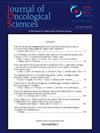The Real-Life Efficacy of the Second Line Treatment Strategy in Advanced Pancreas Cancer
Q4 Medicine
引用次数: 0
Abstract
ABS TRACT Objective: Pancreatic cancer is one of the leading causes of cancer-related death. Despite the introduction of new therapeutic agents, survival rates remain low. Furthermore, few trials have evaluated the options for second-line therapy and the prognostic variables. In this study, we aimed to determine the real-world efficacy and prognostic parameters of second-line treatment for advanced pancreatic cancer. Material and Methods: Patients with advanced pancreatic cancer from different centers who received second-line treatment were enrolled in the study. The patients’ demographic, clinical, and pathological characteristics were retrieved retrospectively. Results: A total of 161 pa- tients were enrolled in the study. The majority of the patients (50.3%) received oxaliplatin plus fluoropyrimidine as second-line treatment. The median progression-free survival and overall survival for the entire cohort were 2.5 months and 4.5 months, respectively. In univariate anal- yses, an Eastern Cooperative Oncology Group performance status ≥ 2, age ≥ 65 years, hypoalbuminemia, thrombocytosis, presence of metastatic peritoneal disease, elevated alkaline phosphatase and carcinoembryonic antigen levels, and a neutrophil-lymphocyte ratio (NLR) ≥ 3 were identified as poor prognostic factors. In multivariable analyses, low albumin level (p=0.031) and high NLR (p=0.05) were found to be independent prognostic factors for overall survival. Conclusion: Pancreatic cancer is a unique malignancy, and advanced disease has a dismal prog- nosis. In univariate analyses, we identified multiple factors that were poor prognostic variables. In particular, the albumin level and NLR were independent prognostic factors for overall survival, and these parameters might be useful in selecting the second-line treatment and pre- dicting the survival of these patients.晚期胰腺癌二线治疗策略的实际疗效
目的:胰腺癌是癌症相关死亡的主要原因之一。尽管采用了新的治疗药物,但生存率仍然很低。此外,很少有试验评估二线治疗的选择和预后变量。在这项研究中,我们旨在确定二线治疗晚期胰腺癌的实际疗效和预后参数。材料和方法:研究纳入了来自不同中心接受二线治疗的晚期胰腺癌患者。回顾性分析患者的人口学、临床和病理特征。结果:共有161例患者入组研究。大多数患者(50.3%)接受奥沙利铂加氟嘧啶作为二线治疗。整个队列的中位无进展生存期和总生存期分别为2.5个月和4.5个月。在单变量肛门分析中,东部肿瘤合作组表现状态≥2,年龄≥65岁,低白蛋白血症,血小板增多,存在转移性腹膜疾病,碱性磷酸酶和癌胚抗原水平升高,中性粒细胞-淋巴细胞比值(NLR)≥3被确定为预后不良因素。在多变量分析中,低白蛋白水平(p=0.031)和高NLR (p=0.05)被发现是总生存的独立预后因素。结论:胰腺癌是一种独特的恶性肿瘤,晚期预后较差。在单变量分析中,我们确定了多个不良预后变量的因素。特别是,白蛋白水平和NLR是总体生存的独立预后因素,这些参数可能有助于选择二线治疗和预测这些患者的生存。
本文章由计算机程序翻译,如有差异,请以英文原文为准。
求助全文
约1分钟内获得全文
求助全文
来源期刊

Journal of Oncological Sciences
Medicine-Oncology
CiteScore
0.10
自引率
0.00%
发文量
16
审稿时长
29 weeks
 求助内容:
求助内容: 应助结果提醒方式:
应助结果提醒方式:


